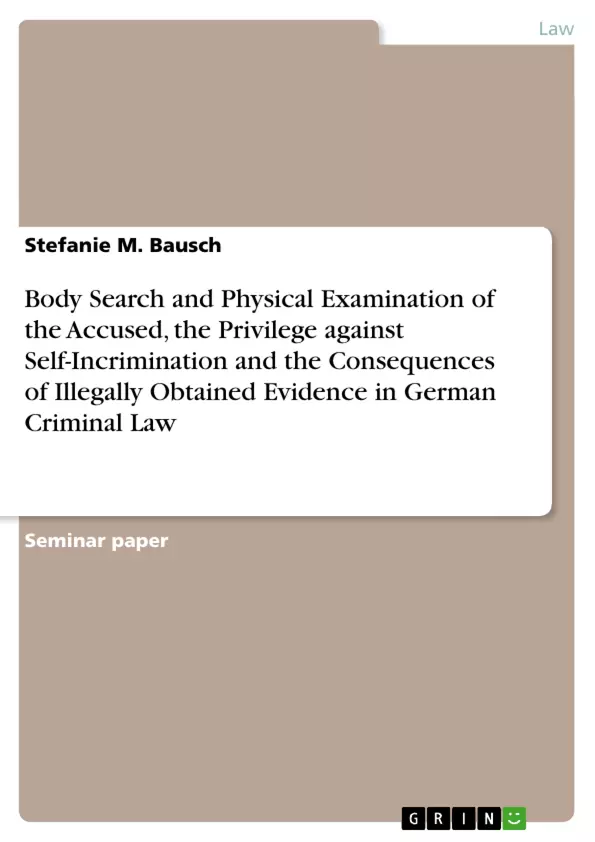In the following seminar paper I will deal with the body search and physical examination of the accused, the privilege against self-incrimination, and the consequences of illegally obtained evidence in German Criminal Law.
In the main part, I will start with the presentation of the sections in the German Code of Criminal Procedure (GCCP) which lay down the provisions concerning the body search and the physical examination of the suspect in criminal proceedings. This will be followed by the requirements the fore-mentioned sections list in order to lawfully obtain evidence. Afterwards I will show different examples that fall under the one or the other and will so develop the differences between these two norms.
Then, I will move on with the privilege against self-incrimination. I will show how this privilege is guaranteed in German Law and if it is violated with regard to body search and physical examination of the accused.
In additional to this, I will also deal with the consequences of illegally obtained evidence with regard to such searches and examinations of the suspect.
In the end, a brief conclusion shall sum up the fore-mentioned findings and ideas.
Inhaltsverzeichnis (Table of Contents)
- I. Introduction
- II. Main Part
- 1. Body Search and Physical Examination of the Accused
- a) Body Search of the Accused
- b) Physical Examination of the Accused
- aa) Physical Examination of the Accused
- bb) Intrusion into the Accused's Body
- 2. The Privilege against Self-Incrimination
- 3. The Consequences of Illegally Obtained Evidence
- 1. Body Search and Physical Examination of the Accused
- III. Conclusion
Zielsetzung und Themenschwerpunkte (Objectives and Key Themes)
This work examines the legal framework surrounding body searches, physical examinations, and the privilege against self-incrimination in German criminal law. It analyzes the application of these principles in practice, considering the potential for abuse and the balancing of individual rights with the need for effective law enforcement.
- The legal framework for body searches and physical examinations of suspects in German criminal law
- The limits of the privilege against self-incrimination in the context of physical examinations
- The consequences of illegally obtained evidence in German criminal proceedings
- The balancing of individual rights and effective law enforcement in the context of body searches and physical examinations
- The potential for abuse and the need for safeguards to protect individual rights
Zusammenfassung der Kapitel (Chapter Summaries)
- I. Introduction: This chapter provides a general overview of the topic and introduces the key legal principles that will be discussed in the following chapters.
- II. Main Part: This section delves into the legal framework governing body searches and physical examinations of suspects in German criminal law. It explores the limits of the privilege against self-incrimination in this context and examines the consequences of illegally obtained evidence.
- 1. Body Search and Physical Examination of the Accused: This chapter provides a detailed analysis of the legal principles governing body searches and physical examinations of suspects, including the procedural requirements and the applicable legal standards.
- 2. The Privilege against Self-Incrimination: This chapter examines the privilege against self-incrimination in the context of physical examinations, considering the scope of the privilege and the potential for exceptions.
- 3. The Consequences of Illegally Obtained Evidence: This chapter analyzes the legal consequences of using evidence obtained through illegal body searches or physical examinations. It explores the remedies available to suspects whose rights have been violated.
Schlüsselwörter (Keywords)
Key terms and concepts covered in this work include: body search, physical examination, privilege against self-incrimination, illegally obtained evidence, German criminal law, procedural law, constitutional rights, evidence admissibility, law enforcement, due process, and balancing of interests.
Frequently Asked Questions
What are the main legal provisions for body searches in German law?
The main provisions are laid down in the German Code of Criminal Procedure (GCCP), specifically sections that differentiate between a simple body search and a physical examination of the accused.
What is the difference between a body search and a physical examination?
A body search typically refers to searching the surface of the body or clothing, while a physical examination involves more intrusive measures, such as an intrusion into the accused's body or medical-style inspections.
How is the privilege against self-incrimination protected in Germany?
The privilege is a fundamental principle in German law, ensuring that a suspect cannot be forced to actively contribute to their own conviction. The paper examines if physical examinations violate this privilege.
What happens to evidence obtained illegally in German criminal proceedings?
Evidence obtained through illegal searches or examinations may face exclusion or specific legal consequences, depending on the severity of the procedural violation and the balancing of interests.
What are the requirements for a lawful physical examination?
A lawful examination requires adherence to specific procedural standards set by the GCCP, including judicial orders (except in cases of imminent danger) and the principle of proportionality.
Does the German law allow for intrusions into the accused's body?
Yes, German law provides legal norms (under strict conditions) for intrusions into the body, such as blood samples, provided they are necessary for the investigation and performed by qualified personnel.
- Citar trabajo
- Dr. Stefanie M. Bausch (Autor), 2004, Body Search and Physical Examination of the Accused, the Privilege against Self-Incrimination and the Consequences of Illegally Obtained Evidence in German Criminal Law, Múnich, GRIN Verlag, https://www.grin.com/document/22919



